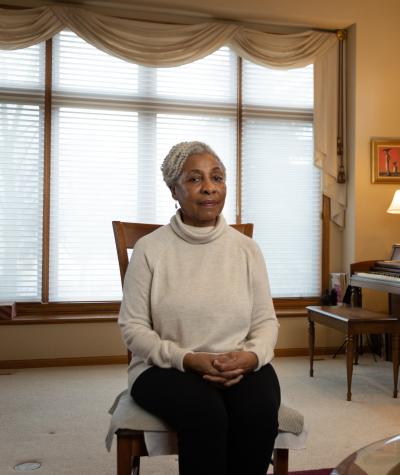The author, Helen Harris, is a resident of Milwaukee and a part of Campaign Legal Center’s (CLC) lawsuit to ensure that Wisconsin’s current state assembly maps are struck down as unconstitutional and new maps are drawn for future elections.
My name is Helen Harris, and I live in Milwaukee, Wisconsin. I came here as a child with my parents from Louisiana in the late ‘40s. They were a part of the great migration of African Americans who left the South in search of opportunities. They settled in the inner city of Milwaukee, on the north side of the city where the majority of African Americans lived.
My husband and I still live in the city, on the northwest side of Milwaukee, and we’ve enjoyed this area very much. It’s a very diverse neighborhood, with a lot of people who want and can afford good housing, but there is also a lot of poverty and need in areas nearby, as there is throughout the city.
Even with the problems living in a large city, my family always appreciated living here and being able to vote, which neither of my parents could do in the South. Also, we generally had city and state legislators who were accessible, lived in the community and who represented our interests.
But after 2010, when the Wisconsin Legislature redrew the state legislative district boundaries, my district changed drastically. It cracked the primarily Democratic district that I was in, separated me from community and put me in a district with legislators that I didn’t feel cared about my interests or what was happening in my community.
For example, an important program called Student Achievement Guarantee in Education (SAGE) was cut in Milwaukee schools that resulted in increased class sizes for students in the early grades and the high-speed rail project, located in the heart of the city, which promised to have good paying jobs, came to a halt. It seemed that many legislators at the state level were not listening to the concerns of their constituents living in the city.
I didn’t see my new legislators in my neighborhood, and I didn’t see them taking up the causes that I believed were important. Over the last 10 years or so, I think that this has had a very negative effect on me, my neighbors and the city of Milwaukee.
In 2015, I became involved in the anti-gerrymandering case, Gill v. Whitford, where I was represented by the Campaign Legal Center (CLC) and co-counsel. At that time, I don’t think I had heard the word gerrymandering, but I quickly learned that it meant exactly what had happened to me — using the redistricting process to give one party an unfair advantage when it comes to voting. This was why I felt it was important for me to participate in that case and support fair maps.
Our case went to the U.S. Supreme Court, and I was fortunate enough to be able to sit at oral argument and listen to questions that the justices asked and the arguments that the attorneys made. Ultimately, the Supreme Court stated that they didn’t think that gerrymandering should be a part of our democracy, but they punted our case back to the district court for additional evidence after deciding that partisan gerrymandering claims must proceed district-by-district.
About a year later, in the case Rucho v. Common Cause, the Supreme Court held that federal courts may not intervene to block partisan election maps, which meant our challenge to the Wisconsin state assembly map could not proceed, despite the harm to voters like myself who were cracked and packed to make our vote count less.
After going through all of that, it has been interesting to see what the redistricting process has been like this time around. The public is much more aware of what gerrymandering is now, and many residents and organizations were drawing their own maps to try to more fairly and accurately represent my community — which has once again been cracked and packed into different districts in the legislature’s proposed maps.
Like last decade, the legislature’s proposed maps give Wisconsin voters — especially Black voters in the Milwaukee area — less opportunity to participate in electing candidates preferred by the community to the state legislature. The result is that it is harder to get the attention of legislators so that they will listen to constituents on the issues that are most important to my community, like ensuring that people have good paying jobs, providing sufficient funding for our public schools and protecting people’s health and safety amid the pandemic.
Because of this, I became part of CLC’s new lawsuit BLOC v. Spindell, which aims to prevent the state assembly maps proposed by the Wisconsin Legislature that crack and pack Black voters in the Milwaukee area, from going into effect. Last month, the state Supreme Court sided with Wisconsin voters, selecting the fairer maps created by the governor, which provide Black voters with a better opportunity to elect their candidates of choice to the state legislature.
The legislature challenged this decision at the U.S. Supreme Court, and in an unprecedented order the U.S. Supreme Court reversed the Wisconsin Supreme Court’s ruling, leaving it unclear which maps will be in place for the August primary and November general election.
As of the time of writing, the Wisconsin Supreme Court has not indicated which maps it will select or what the next steps will be.
Despite the U.S. Supreme Court’s ruling, Wisconsin voters still want fair elections where voters can make their voices heard. We believe that we as voters should be able to choose the people who represent us, not the other way around. That is why we need a more transparent, nonpartisan process for drawing district lines in Wisconsin.
We are all valuable citizens, and our opinions should be listened to. Citizens deserve the opportunity to make their voices heard and to select the people who represent them.
